 |  |  | |
An up close and personal interview with U.S. Coast Guard Veteran and Togetherweserved.com Member:
EN2 Arnold Taylor Lapham U.S. Coast Guard (1966-1970)
PLEASE DESCRIBE WHO OR WHAT INFLUENCED YOUR DECISION TO JOIN THE COAST GUARD?
 I joined the Coast Guard on April 25, 1966 when I was 22-years-old, but I almost joined the Marine Corps. Both recruiting offices were in the Custom House in Boston so I thought I would check out the Coast Guard as well. Especially since an old Navy veteran told me to do so. The Coast Guard won because I figured I could do more for people by saving lives. It also sounded like a good option since I would be working for the Treasury Department. (The Coast Guard was a part of the US Treasury in those days.) I joined the Coast Guard on April 25, 1966 when I was 22-years-old, but I almost joined the Marine Corps. Both recruiting offices were in the Custom House in Boston so I thought I would check out the Coast Guard as well. Especially since an old Navy veteran told me to do so. The Coast Guard won because I figured I could do more for people by saving lives. It also sounded like a good option since I would be working for the Treasury Department. (The Coast Guard was a part of the US Treasury in those days.)
WHETHER YOU WERE IN THE SERVICE FOR SEVERAL YEARS OR AS A CAREER, PLEASE DESCRIBE THE DIRECTION OR PATH YOU TOOK. WHAT WAS YOUR REASON FOR LEAVING?
After boot camp at Cape May NJ, my first choice of assignment was Hawaii so naturally the Coast Guard sent me to Alaska.
At Base Seattle I was assigned to the CGC Balsam W62 out of Adak Alaska.This assignment was for only one year due to the semi-isolated duty on the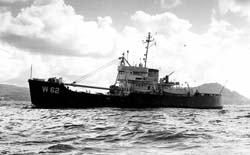 Buoy Tender in the cold waters off Alaska. We did make it above the Arctic Circle on the summer run to repair Aids to Navigation Lights. We also went across the international date line at the same time which entitled me to be a 'Polar Bear' after initiation. Buoy Tender in the cold waters off Alaska. We did make it above the Arctic Circle on the summer run to repair Aids to Navigation Lights. We also went across the international date line at the same time which entitled me to be a 'Polar Bear' after initiation.
One year was enough of Alaska for me. I put in for duty in another warm climate, on the Mississippi River around Louisiana. So I got orders to report to the Coast Guard station at Frankfort, Michigan! My most vivid memory of my 10 months there was the day 9 people drowned as a result of a freak storm that came out of nowhere. 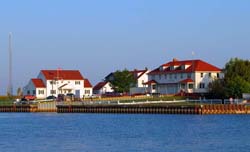 Both the 36 footer and the 40 footer were out on May Day calls in high seas also looking for missing people. We worked for three days straight without sleep and had to get help from Fisheries and Game and the Navy. We received a Letter of Commendation for our efforts from the CG Group Ludington OIC. Both the 36 footer and the 40 footer were out on May Day calls in high seas also looking for missing people. We worked for three days straight without sleep and had to get help from Fisheries and Game and the Navy. We received a Letter of Commendation for our efforts from the CG Group Ludington OIC.
I had thoughts about volunteering for Squadron One because the CG needed Enginemen. About one month after writing my letter for volunteering I received my orders for Alameda, California. RON1 training. It turned out that 5 men at that small Life Boat Station had been sent to Squadron One Vietnam in a period of less than 2 years.I was off for 6 weeks of training in California for the year ahead in Vietnam.
 I didn't feel the training was that great and was disappointed in that 90% of the training was in the class room. At the Marine Base at Camp Pendleton it was more of a show and tell about the weapons we would be using. The only good training was SERE, 'Survival, Evasion, Resistance & Escape' Training. I didn't feel the training was that great and was disappointed in that 90% of the training was in the class room. At the Marine Base at Camp Pendleton it was more of a show and tell about the weapons we would be using. The only good training was SERE, 'Survival, Evasion, Resistance & Escape' Training.
The real training was the on the job training when you got on your boat. Coasties adapt very quickly to most situation fortunately. There are just some things that you can't learn in a classroom or the field.
Finally, duty in a warm climate!! After arriving in Saigon I took a small aircraft ride to Vung Tau to get to my Unit. The pilot announced 'If we are shot down, you are on your own.' I thought to myself, welcome to Vietnam! All I have is a K Bar survival knife for a weapon and if we were to crash that was in my sea bag.
Upon arriving in Cat Lo before getting out of the jeep, I looked down and saw Mike Tower, a Concord  Carlisle HS graduate I ran track with. What were the chances of that happening? Carlisle HS graduate I ran track with. What were the chances of that happening?
Later that day I was aboard the Point Grey. I was replacing EN2 Harry Taylor. We had a new Fireman as well. His name was Swizdor. LJG Doug Meservery also replaced the XO at that time. The Point Grey got underway that evening to spend 3-4 days on patrol.
The CG 82 footers were designed so that the engineering watch did not have to stay in the engine room and that helped for doing other duties on your watch. My first watch on the Point Grey when the boiler caught fire and I used CO2 to extinguish the fire after securing the electrical supply.
The next morning Swizdor and I shot the .50 caliber to see who would be the better shot. I won and Swizdor ended up loading the 81 mm mortar on the bow at GQ.
The days could be very long boarding boat after boat. Sometimes we would find suspects to detain. They would be hiding in the bilges or not have the proper paperwork so they automatically became suspects.
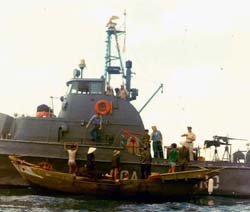 One day GM2 Miller and I were pulling up a fish net and Miller was shot in the knee cap. We used to call these snipers from the beach as Sand Dune Sam. They were always taking pot shots at us. One day GM2 Miller and I were pulling up a fish net and Miller was shot in the knee cap. We used to call these snipers from the beach as Sand Dune Sam. They were always taking pot shots at us.
One thing that puzzled me is why a lot of rivers and canals shores were brown with dead vegetation and no one knew why. A few years later I found out why. Agent Orange.
We had a new cook come aboard. The cook was responsible for the mid ship 50 caliber on the starboard side. His first time at GQ he froze at his gun position when we were taking fire from the beach. I yelled for the Gunner's Mate to relieve him. Later on he did manage to settle down and do his job but it was a bit unnerving at the time.
Back to the real world: We did have 6 weeks training pre-Vietnam but when it was time to come home there was no training.
Welcome Home!! In San Francisco at the airport while waiting for a flight and wearing my uniform with the Vietnam campaign ribbons, a group of young people passed me and one called me a scumbag.
My mother and father worked during the day so I took it easy and enjoyed being home. I found myself carrying a 22 caliber Winchester when my parents were at work. It just felt better to have a rifle with me but shortly after I put it back in the closet as I got used to being back in the real world.
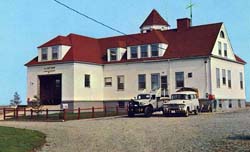 The local Chief of Police and his wife came to the house to go out to dinner with my parents. I was talking to the Chief and he was talking about his future son in law who was in the Army in Vietnam and the difficult times he had. I said yeah I know, I just got back from Vietnam. The Chiefs comment was 'Yeah, but you were just in the Coast Guard." The local Chief of Police and his wife came to the house to go out to dinner with my parents. I was talking to the Chief and he was talking about his future son in law who was in the Army in Vietnam and the difficult times he had. I said yeah I know, I just got back from Vietnam. The Chiefs comment was 'Yeah, but you were just in the Coast Guard."
My last few months was spent at Base Boston and Merrimack Station. It was nice I could go home at night when I didn't have duty.
IF YOU PARTICIPATED IN COMBAT, PEACEKEEPING OR HUMANITARIAN OPERATIONS, PLEASE DESCRIBE THOSE WHICH WERE THE MOST SIGNIFICANT TO YOU AND, IF LIFE-CHANGING, IN WHAT WAY.
Yes I did and they were numerous. At GQ we would support the Army and Marines with 81mm fire and illumination. We would take the Navy Seals and Special Forces to the beach and support them. At night we would carry out operations under darkness and capture or destroy enemy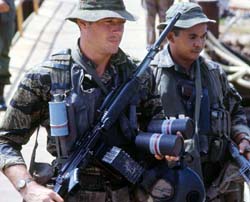 targets. We also destroyed the enemy's fish nets whenever we could. targets. We also destroyed the enemy's fish nets whenever we could.
The worst situation we ever got into took place in the summer of 1969. While on patrol the skipper decided to go up river. I believe was code named 6A Delta. It seemed to be the most hostile place in Division 13. The tide was going out and the water was getting shallower when we hit a sand bar and got stuck high and dry. If that was not bad enough, our Starboard side was parallel with a village about 75 yards off shore. We were already at GQ and I heard bullets wiz by my head. Not waiting for the Skipper, I started firing at the beach. The Skipper said to cease firing and more bullets went by me. I yelled to the skipper "FU". 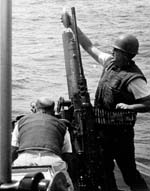 Then all 3 - .50 calibers started firing on the Starboard side. The Skipper finally realized that we were under attack and then ordered "Willie Peter" (White Phosphorous) to be loaded in the 81 mm mortar. Then all 3 - .50 calibers started firing on the Starboard side. The Skipper finally realized that we were under attack and then ordered "Willie Peter" (White Phosphorous) to be loaded in the 81 mm mortar.
My Chief Engineman went to check the engine room and the main engines were shut down. We needed a generator so the Bridge could communicate by radio. The sand and mud was getting into the sand filters and the Chief had to keep switching back and forth filters as the filters were getting clogged with sand and mud and the generators would overheat.
The XO Doug Meservery ordered me to take out 6 San Pans and it only took a couple of minutes to sink them all with the 50 caliber. I don't know how many "KIA" there were.
When things were really getting hot when I saw a jet fighter come in and fly over the Viet Cong village and fire its machine guns. Then the jet fighter came around for  another fly over and dropped Napalm. That was the end of the village and you could feel the heat from the Napalm. another fly over and dropped Napalm. That was the end of the village and you could feel the heat from the Napalm.
It just goes to show you that when you over power the enemy they don't have a chance. In fact you ask any Vietnam Vet if they ever lost a battle and they will most likely tell you no. It was the US Government that lost the Vietnam War!
OF ALL YOUR DUTY STATIONS OR ASSIGNMENTS, WHICH ONE DO YOU HAVE FONDEST MEMORIES OF AND WHY? WHICH ONE WAS YOUR LEAST FAVORITE?
 My favorite assignment was aboard CGC Point Grey C 82324 in Vietnam. We were assigned to Coast Guard Squadron One, a combat unit formed by the United States Coast Guard under the operational control of the United States Navy during the Vietnam War and assigned duties in Operation Market Time. Its formation marked the first time since World War II that Coast Guard personnel were used in a combat environment. Our overall mission was interdicting the movement of arms and supplies from the South China Sea into South Vietnam by Viet Cong and North Vietnam junk and trawler operators. We also provide gun support to raiding parties. My favorite assignment was aboard CGC Point Grey C 82324 in Vietnam. We were assigned to Coast Guard Squadron One, a combat unit formed by the United States Coast Guard under the operational control of the United States Navy during the Vietnam War and assigned duties in Operation Market Time. Its formation marked the first time since World War II that Coast Guard personnel were used in a combat environment. Our overall mission was interdicting the movement of arms and supplies from the South China Sea into South Vietnam by Viet Cong and North Vietnam junk and trawler operators. We also provide gun support to raiding parties.
FROM YOUR ENTIRE SERVICE, INCLUDING COMBAT, DESCRIBE THE PERSONAL MEMORIES WHICH HAVE IMPACTED YOU MOST?
 One of the scariest times I experienced in Vietnam was almost drowning when tangling up in a fish net on the port side screw. This was not uncommon. I always volunteered to cut and remove the fish nets since I had no fear of swimming under the boat. This was done without goggles and the water was muddy so most of it was done by feel. Cutting a net under water is very difficult and the cook used to keep passing me sharp knives every time I came up for air. One of the scariest times I experienced in Vietnam was almost drowning when tangling up in a fish net on the port side screw. This was not uncommon. I always volunteered to cut and remove the fish nets since I had no fear of swimming under the boat. This was done without goggles and the water was muddy so most of it was done by feel. Cutting a net under water is very difficult and the cook used to keep passing me sharp knives every time I came up for air.
One time I got tangled up in the net and could not get out. I had accepted that this was probably it for me but thought if I just relaxed and took my time I might get out. It worked and I was able to surface.
Fortunately the starboard screw was not tangled up and we made our way on the remaining screw to a Navy salvage ship where it took a Navy diver all day to remove the net.
WHAT ACHIEVEMENT(S) ARE YOU MOST PROUD OF FROM YOUR MILITARY CAREER? IF YOU RECEIVED ANY MEDALS FOR VALOR OR OTHER SIGNIFICANT AWARDS, PLEASE DESCRIBE HOW THESE WERE EARNED.
 All 13 Medals and ribbons. But the Navy marine Achievement Medal with Combat "V" means a lot. All 13 Medals and ribbons. But the Navy marine Achievement Medal with Combat "V" means a lot.
I guess the XO Doug Maservy thought me worthy of the medal because I was good at hitting enemy targets with the 50 caliber.
Also My Chief EN, Fireman, and myself took pride in our engineroom. It was spotless, from the bilges to the overhead. Every time we came off patrol we would soogy the two main engines and the two generators. We really took pride of our engineroom and it ran well.
WHICH INDIVIDUAL(S) FROM YOUR TIME IN THE MILITARY STAND OUT AS HAVING THE MOST POSITIVE IMPACT ON YOU AND WHY?
 LTJG Doug Maservey XO on Point Grey. He was a great leader in Vietnam and a good friend. It was Doug the gave the nickname for the Point Grey, "Gray Ghost". The Gray Ghost is a fishing lure!! LTJG Doug Maservey XO on Point Grey. He was a great leader in Vietnam and a good friend. It was Doug the gave the nickname for the Point Grey, "Gray Ghost". The Gray Ghost is a fishing lure!!
CAN YOU RECOUNT A PARTICULAR INCIDENT FROM YOUR SERVICE WHICH MAY OR MAY NOT HAVE BEEN FUNNY AT THE TIME, BUT STILL MAKES YOU LAUGH?
When the South Vietnamese 'poop' hut over the river was blown up at Base Cat Lo! I know who did it.
Also when I saw the American Flag flying over the South Vietnamese Cat Lo Base. That really pissed off the Vietnamese!
WHAT PROFESSION DID YOU FOLLOW AFTER YOUR MILITARY SERVICE AND WHAT ARE YOU DOING NOW? IF YOU ARE CURRENTLY SERVING, WHAT IS YOUR PRESENT OCCUPATIONAL SPECIALTY?
 I am now a retired Corporate Buyer.
WHAT MILITARY ASSOCIATIONS ARE YOU A MEMBER OF, IF ANY? WHAT SPECIFIC BENEFITS DO YOU DERIVE FROM YOUR MEMBERSHIPS?
Coast Guard Combat Veterans
VFW
DAV
Mobile Riverine Force Association
Bearing Sea Patrol
IN WHAT WAYS HAS SERVING IN THE MILITARY INFLUENCED THE WAY YOU HAVE APPROACHED YOUR LIFE AND YOUR CAREER?
I was very immature and the Coast Guard changed that and I became very secure about myself. The Coast Guard really lets you do your job and work as a team. Because the Coast Guard is small you must be a team player and overlap your duties to get the job done.
IN WHAT WAYS HAS TOGETHERWESERVED.COM HELPED YOU REMEMBER YOUR MILITARY SERVICE AND THE FRIENDS YOU SERVED WITH.
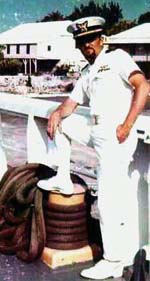 Bill Landry, a former Commander in the Coast Guard, and lives in the Philippines invited me to join to record my Coast Guard experience. Bill Landry, a former Commander in the Coast Guard, and lives in the Philippines invited me to join to record my Coast Guard experience.
Through Togetherweserved I look forward to making contact with other Coasties as I have done with those in the Coast Guard Combat Veterans Association.
It is also a great place to record my military history in one place and have the ability to share it with my family, friends and other members or former members of the U.S. Coast Guard.
Thank you for providing us this great site.
 |


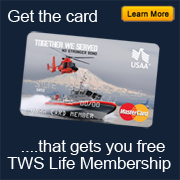
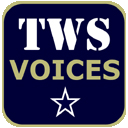
Read Other Interviews in the TWS Voices Archive
| Share this Voices Edition on:


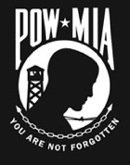  |
|
TWS VOICES
TWS Voices are the personal stories of men and women who served in the US Military and convey how serving their Country has made a positive impact on their lives. If you would like to participate in a future edition of Voices, or know someone who might be interested, please contact TWS Voices HERE.
This edition of Coast Guard Voices was supported by:
Â
Â
CoastGuard.Togetherweserved.com
For current and former serving Members of the US Coast Guard and US Coast Guard Reserve, TogetherWeServed is a unique, feature-rich resource enabling Coast Guardsmen to re-connect with lost Shipmates, share memories and tell their Coast Guard story.
To join CoastGuard.Togetherweserved.com, please click HERE.
| |